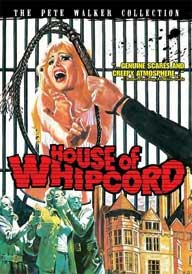 HOUSE
OF WHIPCORD (1974)
HOUSE
OF WHIPCORD (1974)
Director: Pete Walker
Shriek Show/Media Blasters
Shocking, violent, and
as intelligent as they were graphic, Pete Walker’s horror films never
hid from controversy. With undeniable enthusiasm and a cultural terrorist's
knowledge of human frailty, his eerie ensembles seethed with social commentary
and explicit gore, diving headfirst into subjects that his era wished to ignore.
He not only makes his audience face the distasteful, he makes them choke on
reflections of its prejudices, focusing here on the baseness of a justice
system whose rigidity lends itself to fanaticism.
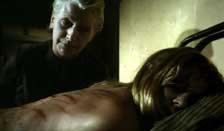
Perhaps no other film in the Walker cannon is as scorching, thoughtful, or
politically effective as HOUSE OF WHIPCORD, a jaw-knocking, bodice-ripping
attack against ‘holier than thou’ mentalities. Raising our sense
of outrage alongside terror and revulsion, a carefully written script by Walker
regular David McGillivray evokes impressive sympathy for characters who are
treated with compassion – that is, before they are subjected to a world
turned upside down, its threat magnified because its terrors stem from the
laws of society. A medicine for mediocrity, this rabid piece of cinema is
everything a horror film should be; emotionally rousing and shocking. It's
the perfect, grainy little pill with which to treat the sickness of limp Hollywood
remakes and popcorn movies which display small balls and smaller brains in
their desperate attempts to rape the wallets of single mothers and adolescents.
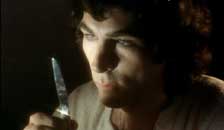 In
Swinging 1970s England – an era thought by conservatives to have been
a cesspool of immoral decadence requiring stern legal measures – Ann-Marie
(Penny Irving of "Are You Being Served?" fame), a 19 year old model,
is captivated by the attractive Mark E. Desade (Robert Tayman from Hammer's
VAMPIRE CIRCUS), who leads her to a prison masquerading as a country home. Ran
by folks whose unbendable devotion to the Law (impervious to the fact that they're
breaking both moral and penal laws by stripping victims of social rites and
liberties, not to mention their lives), this house of punishment indulges in
such character-building reforms as solitary confinement, floggings, and death
by hanging.
In
Swinging 1970s England – an era thought by conservatives to have been
a cesspool of immoral decadence requiring stern legal measures – Ann-Marie
(Penny Irving of "Are You Being Served?" fame), a 19 year old model,
is captivated by the attractive Mark E. Desade (Robert Tayman from Hammer's
VAMPIRE CIRCUS), who leads her to a prison masquerading as a country home. Ran
by folks whose unbendable devotion to the Law (impervious to the fact that they're
breaking both moral and penal laws by stripping victims of social rites and
liberties, not to mention their lives), this house of punishment indulges in
such character-building reforms as solitary confinement, floggings, and death
by hanging.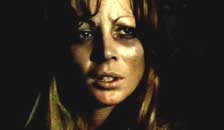
Mrs. Wakehurst
(Barbara Markham), Mark’s mother and Justice Bailey's (Patrick Barr's)
administrator, charges Anne with lewdness, and Bailey quickly passes sentence,
decreeing that she must be imprisoned until worthy of release – that is,
never if the chillingly believable Wakehurst and her two uniformed jailers have
anything to say about it. Wakehurst indulges in her own secretive sins as she
and her cohorts torment, exhort, and punish ‘the sinners.’ The house
as prison metaphor, and the angry middle-aged female wardens, are creepily effective
as the stern, emotionless tools of punishment, feeding their own perverse urges
in the sanitized name of “the law.” The movie is an obvious if effective
parody of a culture which craves the punishment (and spectacle) of the condemned
while often guilty of the same instincts. Kinky, savage punishments are interspersed
with moments of bonding between Ann-Marie and other inmates, while Julia (Ann
Michelle, sexy star of PSYCHOMANIA and THE VIRGIN WITCH), a friend, attempts
to locate the missing girl. Will she be in time . . .?
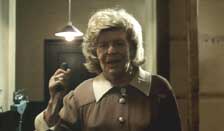 HOUSE
OF WHIPCORD asks no understanding of its audience. Tyranny, madness, and a social
system exposed by Walker as bad if not worse than the criminals it judges are
the order of the day . . . and the jury is demented! More importantly is Walker’s
not-so-subtle condemnation of people who see themselves as handmaids of justice
– folks psychologically unbalanced, tools of nothing more profound than
the base hunger for power. Sporting a psychologically penetrating, socially
condemning screenplay, this movie is equal parts exploitation and expose of
a culture that now, as then, is quick to condemn.
HOUSE
OF WHIPCORD asks no understanding of its audience. Tyranny, madness, and a social
system exposed by Walker as bad if not worse than the criminals it judges are
the order of the day . . . and the jury is demented! More importantly is Walker’s
not-so-subtle condemnation of people who see themselves as handmaids of justice
– folks psychologically unbalanced, tools of nothing more profound than
the base hunger for power. Sporting a psychologically penetrating, socially
condemning screenplay, this movie is equal parts exploitation and expose of
a culture that now, as then, is quick to condemn. 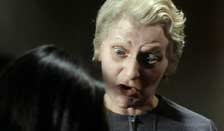
While unapologetically
exploitative in its material, HOUSE OF WHIPCORD clearly has more on its mind
than titillation. Whippings, executions, and lunacy are accompanied by careful
examinations of law, justice, and struggle for survival. A sense of emotional
cold severity – symbolized by the Law as concept and the Judge’s
ramblings, as well as by the plot itself – is evoked here by the icy warden's
conviction in their own authority. Shelia Keith (as warden Walker) is outstanding,
as usual, stealing the show in all her fanatical fierceness. She is cruel punishment
embodied in wrinkled, frenzied staring flesh. The movie's sense of moral outrage
is externalized by somber green-hued lighting, and the sterile yet decrepit
interiors of the prison interior. Walker's sure direction and careful placement
of camera ensures that we receive the proper visual stimulus that each queasy
scene demands. A
more intelligent and effective entry of the W-I-P films of 1970s infamy, HOUSE
OF WHIPCORD is a grim odyssey into the same thematic decadence that Walker mined
from a different perspective in FRIGHTMARE. Whereas in the later film he lamented
the permissiveness that allowed cannibals to re-enter society, in this spectacle
of law-gone-wrong his moral vantage point appears comes from the left, suggesting
that society is too quick to judge.
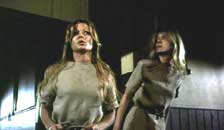 A
1.85:1 anamorphic widescreen transfer has a a good level of picture detail and
does a nice job presenting drab, emotionally bleak colors with a maximum of
effectiveness. Small amounts of grain don't noticeably distract from the movie,
and the framing appears correct. Picture quality overall is very good, looking
much cleaner than in the earlier Image release. Audio is in English mono and/or
5.1 surround sound, both of which are clear and scratch free, summon forth the
grunts, cries, and screams of Walker's hell into your living room.
A
1.85:1 anamorphic widescreen transfer has a a good level of picture detail and
does a nice job presenting drab, emotionally bleak colors with a maximum of
effectiveness. Small amounts of grain don't noticeably distract from the movie,
and the framing appears correct. Picture quality overall is very good, looking
much cleaner than in the earlier Image release. Audio is in English mono and/or
5.1 surround sound, both of which are clear and scratch free, summon forth the
grunts, cries, and screams of Walker's hell into your living room.
As in other volumes of the Pete Walker collection, Media Blasters features an
insightful commentary with director Walker, wherein he discusses several intimate
and broad facets of the film's history, preparation, production, the press,
and its social upsets. We learn about location searches, his reflections on
actors, and what a tasking chore producing a movie truly is. Such is Walker's
enthusiasm that you can't help but be interested in what he has to say. Besides
this commentary is the feature's theatrical trailer, trailers for the other
films in the series, and a small photo gallery. (William
P. Simmons)
BACK
TO REVIEWS
HOME
 HOUSE
OF WHIPCORD (1974)
HOUSE
OF WHIPCORD (1974)
 In
Swinging 1970s England – an era thought by conservatives to have been
a cesspool of immoral decadence requiring stern legal measures – Ann-Marie
(Penny Irving of "Are You Being Served?" fame), a 19 year old model,
is captivated by the attractive Mark E. Desade (Robert Tayman from Hammer's
VAMPIRE CIRCUS), who leads her to a prison masquerading as a country home. Ran
by folks whose unbendable devotion to the Law (impervious to the fact that they're
breaking both moral and penal laws by stripping victims of social rites and
liberties, not to mention their lives), this house of punishment indulges in
such character-building reforms as solitary confinement, floggings, and death
by hanging.
In
Swinging 1970s England – an era thought by conservatives to have been
a cesspool of immoral decadence requiring stern legal measures – Ann-Marie
(Penny Irving of "Are You Being Served?" fame), a 19 year old model,
is captivated by the attractive Mark E. Desade (Robert Tayman from Hammer's
VAMPIRE CIRCUS), who leads her to a prison masquerading as a country home. Ran
by folks whose unbendable devotion to the Law (impervious to the fact that they're
breaking both moral and penal laws by stripping victims of social rites and
liberties, not to mention their lives), this house of punishment indulges in
such character-building reforms as solitary confinement, floggings, and death
by hanging.
 HOUSE
OF WHIPCORD asks no understanding of its audience. Tyranny, madness, and a social
system exposed by Walker as bad if not worse than the criminals it judges are
the order of the day . . . and the jury is demented! More importantly is Walker’s
not-so-subtle condemnation of people who see themselves as handmaids of justice
– folks psychologically unbalanced, tools of nothing more profound than
the base hunger for power. Sporting a psychologically penetrating, socially
condemning screenplay, this movie is equal parts exploitation and expose of
a culture that now, as then, is quick to condemn.
HOUSE
OF WHIPCORD asks no understanding of its audience. Tyranny, madness, and a social
system exposed by Walker as bad if not worse than the criminals it judges are
the order of the day . . . and the jury is demented! More importantly is Walker’s
not-so-subtle condemnation of people who see themselves as handmaids of justice
– folks psychologically unbalanced, tools of nothing more profound than
the base hunger for power. Sporting a psychologically penetrating, socially
condemning screenplay, this movie is equal parts exploitation and expose of
a culture that now, as then, is quick to condemn. 
 A
1.85:1 anamorphic widescreen transfer has a a good level of picture detail and
does a nice job presenting drab, emotionally bleak colors with a maximum of
effectiveness. Small amounts of grain don't noticeably distract from the movie,
and the framing appears correct. Picture quality overall is very good, looking
much cleaner than in the earlier Image release. Audio is in English mono and/or
5.1 surround sound, both of which are clear and scratch free, summon forth the
grunts, cries, and screams of Walker's hell into your living room.
A
1.85:1 anamorphic widescreen transfer has a a good level of picture detail and
does a nice job presenting drab, emotionally bleak colors with a maximum of
effectiveness. Small amounts of grain don't noticeably distract from the movie,
and the framing appears correct. Picture quality overall is very good, looking
much cleaner than in the earlier Image release. Audio is in English mono and/or
5.1 surround sound, both of which are clear and scratch free, summon forth the
grunts, cries, and screams of Walker's hell into your living room.